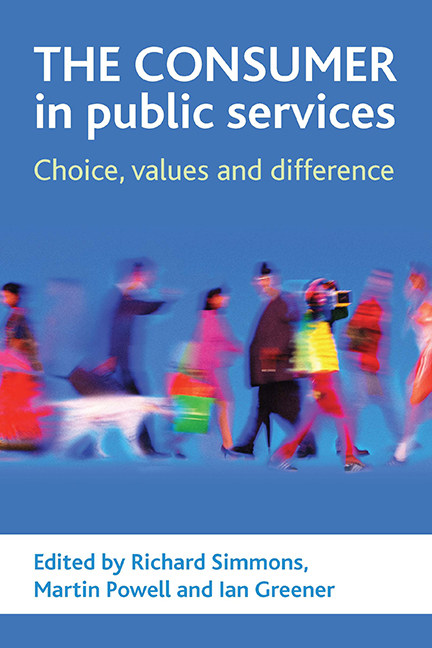Book contents
- Frontmatter
- Contents
- List of figures and tables
- Acknowledgements
- Notes on contributors
- Foreword
- one Introduction: managing the ‘unmanageable consumer’
- two The consumer and New Labour: the consumer as king?
- three Narratives of public service delivery in the UK: comparing central and local government
- four Understanding the ‘differentiated consumer’ in public services
- five Differentiating consumers in professional services: information, empowerment and the emergence of the fragmented consumer
- six The healthcare consumer
- seven The consumer in education
- eight The consumer and social housing
- nine The people’s police? Citizens, consumers and communities
- ten The consumer in social care
- eleven Differentiated consumers? A differentiated view from a service user perspective
- twelve Authoritative consumers or experts by experience? User groups in health and social care
- thirteen The public service consumer as member
- fourteen Conclusion: the consumer in public services
- Index
Foreword
Published online by Cambridge University Press: 22 January 2022
- Frontmatter
- Contents
- List of figures and tables
- Acknowledgements
- Notes on contributors
- Foreword
- one Introduction: managing the ‘unmanageable consumer’
- two The consumer and New Labour: the consumer as king?
- three Narratives of public service delivery in the UK: comparing central and local government
- four Understanding the ‘differentiated consumer’ in public services
- five Differentiating consumers in professional services: information, empowerment and the emergence of the fragmented consumer
- six The healthcare consumer
- seven The consumer in education
- eight The consumer and social housing
- nine The people’s police? Citizens, consumers and communities
- ten The consumer in social care
- eleven Differentiated consumers? A differentiated view from a service user perspective
- twelve Authoritative consumers or experts by experience? User groups in health and social care
- thirteen The public service consumer as member
- fourteen Conclusion: the consumer in public services
- Index
Summary
Our relationship with the state has filled the pages of novels and tracts for the last two centuries, but there has been far less attention to the everyday experience of this relationship and how we should understand and improve it.
Are we consumers, citizens, clients, users, passengers, patients or prisoners of public services? Well, people make sense of this relationship in different ways. As one of the people interviewed in research in this book states, “they just call me John”. We should not be surprised that words are slippery if we are dealing with such a myriad of different public services. But it is no help if the thinking behind these services is slippery, because different ways of thinking about the ‘public’ in ‘public services’ can lead to very different outcomes.
To begin with, the post-war European consensus was that certain basic needs for health, education, shelter and security should be underwritten by the state. Tackling poverty, in particular, was where the market had failed, and it was the role of the welfare state to take the lead. But this is quite different from the social contract advanced in the USA, in which poverty was seen as an issue of discrimination, limiting the access of citizens to market opportunities and livelihoods.
What we have seen is that the benefits of the European model have come at a price, which is that the agency of individual service users was degraded over time. Service users were designed to be passive, conceptualised in a deficit model in which what they lacked was what public services provided. They were not partners. They were beneficiaries. Their obligation, as well as voting for the taxes required to sustain the work, was to be grateful. And, for a long time, they were. But the weaknesses of the bureaucratic state have led to the outcome that people tend to get the services that others – public service professionals – think that they ought to have.
One thing that people tend to value is the quality of how they experience services. Many public services, from health to welfare, achieve what professionals intend, but in the process generate a degree of stigma, denying people's dignity.
- Type
- Chapter
- Information
- The Consumer in Public ServicesChoice, Values and Difference, pp. xii - xivPublisher: Bristol University PressPrint publication year: 2009
- 1
- Cited by

